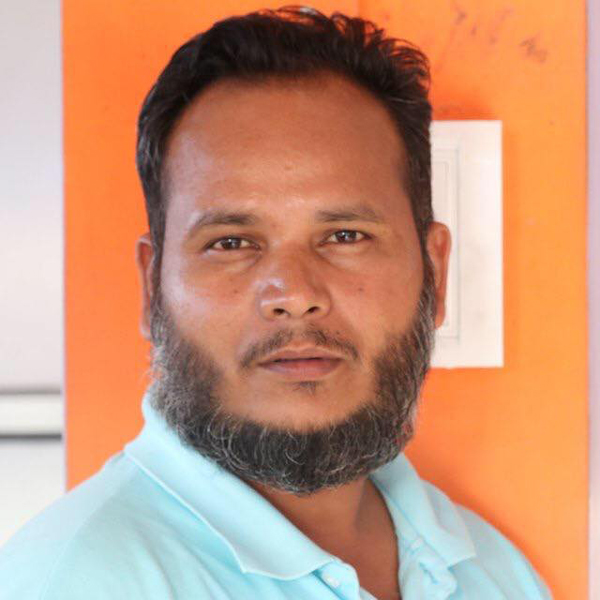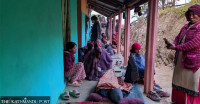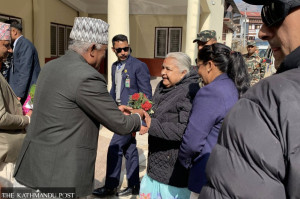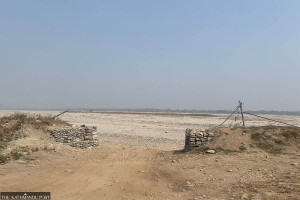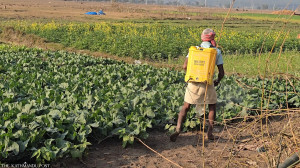Koshi Province
Bhutanese languishing in camps decry Nepali leaders’ deceitful substitution of genuine refugees
Refugees living in Jhapa and Morang districts of eastern Nepal lament those in power are trying to profit from their miseries.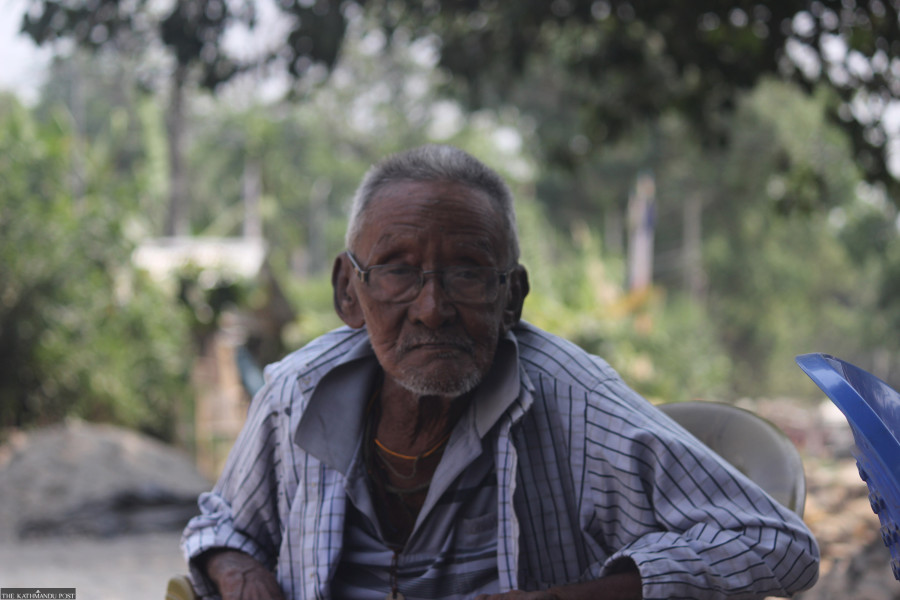
Parbat Portel
Duryodhan Gurung is 80 years old. He is among the hundreds of Bhutanese living in a refugee camp in Beldangi, Jhapa in eastern Nepal for the past three decades. He came to know about the fake Bhutanese refugee scam that came to light over a month ago through his neighbour.
Duryodhan is enraged that people in power are appropriating the refugees’ sorrows and trying to profit from their miseries. He is sceptical of the Nepal government bringing the case to a justified conclusion. “The Nepali government has failed us before and it’s no surprise it is doing so again,” said Duryodhan.
In the past two weeks, a series of arrests including that of former home minister and Nepali Congress leader Bal Krishna Khand last week in connection with the fake Bhutanese refugee scam exposed the deep-seated and long-standing corruption in Nepal.
Police have so far arrested 12 people in the scam.
While discourse has begun on the scam’s possible implications on Nepal’s image globally, citing the dubiousness of the Nepali political and bureaucratic leaderships, the registered refugees who are still languishing in camps in Jhapa and Morang districts in the eastern plains of Nepal for over three decades feel that they have been dealt yet another blow.
“Apart from our sorrows, what else do we [Bhutanese refugees] even have to share?” exclaimed Khem Prasad Adhikari, a refugee at the camp in Beldangi, Jhapa. “All we are left here with is pain.”
Unlike the majority of refugee families, none of Khem Prasad’s family members moved abroad. All of his five family members live in the refugee camp. “We didn’t qualify for third-country resettlement due to minute errors in our documents,” the 76-year-old told the Post. “Any hopes of us moving elsewhere died when the UNHCR [the United Nations High Commission for Refugees] ended the group resettlement programme of refugees from Bhutan in Nepal in 2016.”
Khem Prasad was neither keen on moving back to Bhutan, unlike some of his contemporaries who still harbour hopes of returning to their home country, nor did he wish to continue living in the refugee camp. All he wanted was to move to the US and spend his remaining days in peace and tranquillity.
“Of course, I wanted to go to the US, but fate didn’t agree,” he said. He suffers from debilitating pain, a result of his recent prostate surgery, and needs medication round the clock. “I work as a labourer and it is getting increasingly difficult to make ends meet and bear my medical expenses,” he said.
According to Champa Singh Rai, the secretary of Sanischare refugee camp in Morang, the refugees living in camps stopped receiving aid through international agencies after the completion of the third-country settlement programme in 2016. The UNHCR and other humanitarian agencies, including the World Food Programme, stopped providing food and direct cash support to the refugees who remained in Nepal.

The United Nations refugee agency currently provides a monthly expense of Rs1,000 to those in desperate need of help.
“All of the refugees have to work as daily wagers to earn a living,” Rai said. “Some are able to sustain on the financial help provided by their family members living abroad but those who don’t have anyone else looking out for them struggle to survive in their old age.”
Shukra Bahadur Gurung was a young, strong man when he and his family of eight were exiled from Samtse, Bhutan. Shukra Bahadur entered Nepal via the Mechi border and settled at the Khudunabari refugee camp in Jhapa.
Now aged 88, Shukra Bahadur spends his days remembering his friends who resettled abroad. The memories of Bhutan continue to haunt him to this day, he says.
Following the resettlement of Bhutanese refugees beginning in 2006, those living in the Khudunabari and Timai refugee camps were shifted to the Beldangi camp.
After his wife’s death in 2011, Shukra Bahadur moved to Beldangi.
“After we were chased from Bhutan, we came to Nepal and resettled at the Khudunabari refugee camp,” he said. “I have been living in Beldangi since 2012.”
Like many young refugees, Shukra Bahadur’s children, except his daughter, have moved to the United States. He, however, refused to leave and currently lives with his daughter, who could not travel to the US due to the lack of proper documents, and his son-in-law at the camp.
“I didn’t want to go because I am a refugee here in Nepal and would still be a refugee there in the US,” he said. “I only want to go back home to Bhutan before I die.”
Shukra Bahadur is unaware of the current Bhutanese refugee scam. He says he has heard bits and pieces about how politicians and bureaucrats are scamming people in the name of Bhutanese refugees, but he hasn’t been able to grasp the incident in its entirety.
“Those who are guilty must be punished,” he said. “I may not understand much at this age, but I do know that no one has the right to make a joke out of our situation.”
Dumbar Kumari Ghimire lives alone at the refugee camp. The 84-year-old is a mother of four—three daughters and a son. Two daughters and the son have resettled in the US while one daughter has moved to Sarlahi.

Before arriving at the refugee camp, Dumbar Kumari spent two years in India after her exile from Bhutan.
“My daughters and sons-in-law insisted that I move to the US with them,” she said. “But I didn’t feel like going.”
Dumbar Kumari spends her days at the old age home built by the Intra-national Welfare and Support Foundation, an organisation of Bhutanese refugees seeking asylum in the US.
The octogenarian says days go by but nights are hard to get through. “The thoughts of my relatives in Nepal, Bhutan and the US keep me awake,” she said. “I worry about them all the time.”
According to Rai, there are around 6,000 refugees living in Jhapa and Morang. Of them, 429 refugees are in the documentation process of being verified as Bhutanese refugees.
Among the remaining refugees, some did not wish to move to a third country citing old age and their desire to go back to Bhutan while others did not qualify due to errors in their documents. “There are also a few who were found involved in criminal activities,” Rai told the Post. “Many, who should have been registered, are also left out. It is sad to hear about the fake refugee scam. The refugees are real people living with many challenges and instead of easing their problems, the Nepal government is making light of their situation.”
Between 2006 and 2016, a total of 113,500 refugees have resettled in eight different countries, including the US, the UK, Canada and Australia, through the resettlement programme, Rai added.
Following the scam, the UNHCR expressed its concern about the reports coming out of Nepal. In a statement last week, the agency said it welcomes the ongoing investigation and that the group resettlement programme of refugees from Bhutan in Nepal ended on December 31, 2016, and will not resume again.

Surviving as a stateless citizen, chased away from their country of birth, taking shelter in a host country and being resettled in a foreign land separated from family and friends is a life filled with misery and despair, says Dhan Bahadur Magar, aged 55.
“My wife and children are in Canada but my documents had some issues so I did not qualify to go with them,” said Dhan Bahadur. “I live a solitary life without my family and as I get older, surviving without them is becoming painful. While we live this miserable life, politicians and bureaucrats do not think twice before committing a crime in our name.”




 18.12°C Kathmandu
18.12°C Kathmandu